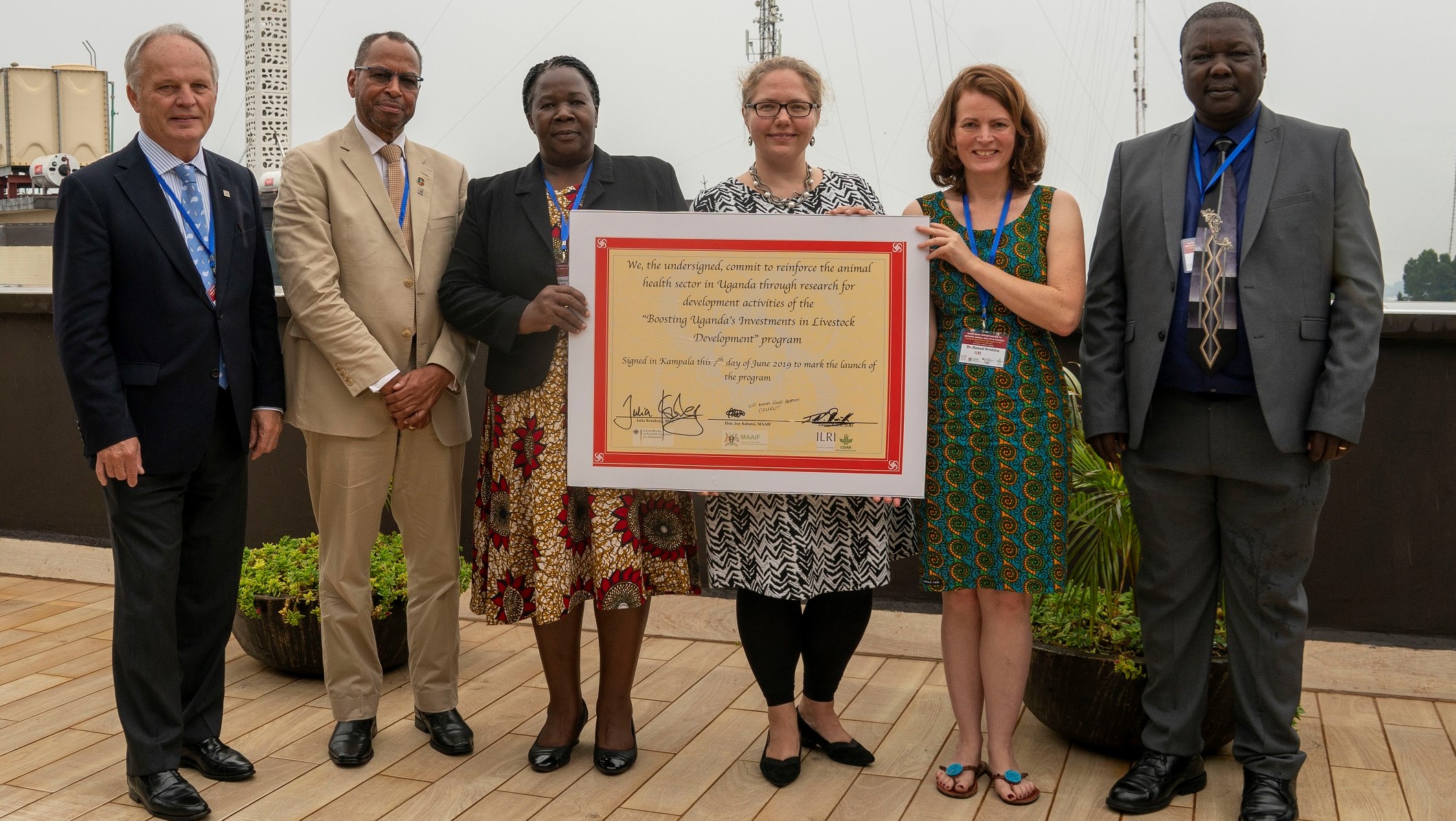
Boosting Uganda’s Investments in Livestock Development,
2019-2023 (Photo Credit: ILRI/Julius Bitarabeho)
Written by Ekta Patel
In early June this year, policymakers, researchers, government and private sector representatives from Kenya, Germany and Uganda met in Uganda to kick-off investments in Uganda’s livestock sector through the #BuildUganda Program which has been funded by the Federal Ministry for Economic Corporation and Development (BMZ) and the Consultative Group for International Agricultural and Research (CGIAR) research programs on Livestock and Agriculture for Nutrition and Health (A4NH).
The project which entails four components, namely, control and eradication of peste des petits ruminants and other diseases affecting small ruminants, controlling zoonotic disease like Rift valley fever affecting cattle, mitigating the risks of antimicrobial resistance (AMR) in the poultry value chain and improving veterinary public health at the abattoirs, provided an opportunity for component leaders to share their aims and plans as well as sought out feedback and guidance from stakeholders on its focus, deliverables and field sites.
Julia Kronberg, Head of Development Cooperation at the German Embassy in Kampala, who welcomed participants on behalf of BMZ, commemorated the event. She emphasized that this investment in Uganda’s livestock sector is guided by the BMZ 2030 Agenda for Sustainable Development. She argued that economic growth leads to opportunities for individuals to improve rural nutrition and growth in job opportunities.
Speaking on behalf of the Ministry of Agriculture, Animal Industry and Fisheries (MAAIF), Rose Ademun, Uganda’s Chief Veterinary Officer welcomed all participants and this new program in particular as part of the government’s efforts to really inform policymaking through scientific evidence.
This component specifically aims to understand the current antimicrobial use in poultry value chains, assess risks to humans from poultry-associated antimicrobial resistance (AMR), support evidence-based policy dialogue for surveillance and strategies and build capacities of researchers, consumers and value chain actors.
Some of the planned activities to mitigate the risks of AMR in the poultry production systems in Uganda include:
- Investigating and quantify the use of antimicrobials in the poultry value chains in the country,
- Establishing a phenotypic resistance pattern of selected enterobacteriaceae, specifically Escherichia coli and Salmonella spp by conducting sampling of fecal matter, meat and eggs from the poultry farms along the poultry value chain,
- Assessing public health risks related to AMR in the poultry value chains,
- Supporting the involvement and training of stakeholders in the poultry sector in Uganda, which would include animal health workers, producers, suppliers such as feed and drug stock suppliers, and policy makers,
- Contributing information to the national AMR action plan, which has been derived from synthesizing and discussing the results of the data generated.
#BuildUganda partner Bernd-Alois Tenhagen of the German Federal Institute for Risk Assessment (BfR) visited the local poultry farms and says ‘I see significant challenges but we hope to apply our models to recognize the risk and protect health which are the two tasks that BfR is committed towards independent and progressive consumer protection.’
Brian Kyangulangyi, sales manager at the Kampala-based Biyinzika Poultry International Ltd, a poultry breeder and supplier of day-old-chicks, elaborated that currently the company supplies feeds and supplements to commercial poultry farms as well as smallholder poultry farms. The company rears chickens and also dresses 6,000 per day. Kyangulangyi added ‘We are keen to promote good management practices and have invested in veterinarians on the farms and we avoid using antimicrobials. Our company aims to understand the way farms manage chickens, and we aim to change mindsets on rearing chickens because poor management results in diseases which inevitably leads to the use of antimicrobials on these farms.’
Richard Erechu, the #BuildUganda AMR representative from the Ministry of Agriculture, Animal Industry and Fisheries (MAAIF) added ‘the AMR sector is being prompted to realize that in order to fight poverty, the government needs to support the activities’.
Karim Wanga from the Ministry of Health in Kenya says ‘AMR is a OneHealth problem and farmers are using antibiotics for humans on animals, it is important to understand where the residues that cause resistance are coming from.’
Dieter Schillinger, the deputy director-general leading the bioscience directorate at ILRI said, 'Investment by BMZ is a strong recognition of the importance of livestock in Uganda and anticipates a wider collaboration with the Ugandan government on other programs.' He also anticipates additional collaboration with BMZ in Africa to improve animal health and by doing so improving the livelihood of smallholder livestock farmers in Africa.
For more information contact Kristina Roesel
Additional information:
- ILRI news item on the project
- ILRI project brief
- Presentations and reports from the project
- Photos from the launch event